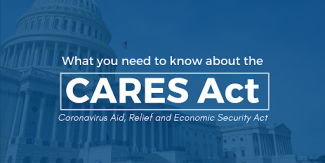
CARES Act
The Coronavirus Aid, Relief and Economic Security (CARES) Act was passed by Congress and signed into law on March 27th, 2020. Some of the key aspects are explained below.
Recovery Rebates
Taxpayers who filed a 2018 or 2019 tax return and included their bank information on their return will receive a direct deposit of $1,200 per individual ($2,400 per couple) plus $500 per children under age 17 within the next few weeks. If the IRS does not have your bank information, you will receive a check later this summer. However, an on-line tool should be available soon to allow taxpayers to enter bank information. The rebate starts to phase out at $75,000 of adjusted gross income for individuals, $112,500 for head of household, and $150,000 for couples. You will receive no rebate if your income is over $99,000 (individual), $146,500 (head of household), or $198,000 (couple). However, if you only receive a partial rebate—or no rebate at all—because your income is too high and if your 2020 income is lower than the phase-out threshold, you will receive money next year.
Tax Deadlines
July 15 is the due date for filing your tax returns and paying any amount due, as well as for paying both the first and second quarters of estimated taxes. The July 15 due date also applies to your Ohio, School District, and city returns and estimates.
IRA Deadlines
July 15 is also the due date to fund your 2019 Traditional, Roth, or SEP-IRA as well as for funding your Health Savings Account.
Required Minimum Distributions:
RMDs from retirement accounts (including retirement plans such as 401(k) plans as well as Inherited IRAs) have been waived for 2020. If you inherited an IRA this year and were required to withdraw all money from the IRA within 5 years, you now have 6 years to cash out the IRA. If you have already started to withdraw your RMDs this year, you may be able to put the money back into your IRA.
Other Highlights:
- Penalty-free (not tax-free) distributions are permitted from IRAs by individuals affected by the Corona virus.
- Charitable deduction rules have been expanded, including the ability to deduct $300 in charitable contributions even if you don’t itemize
- Unemployment benefits have been expanded.
- Small businesses may be eligible for special assistance including Paycheck Protection loans, Employee Retention Credit and deferral of payroll taxes for
- Individuals with student loans can suspend payments until September 30, 2020 and no interest will accrue.
- Individuals on Medicare will receive no-cost COVID-19 vaccine (when available).
- Medicare Part D recipients can request a 90-day supply of medication
- Health Savings Account and Flexible Savings Account funds can be used for over-the-counter medications.

